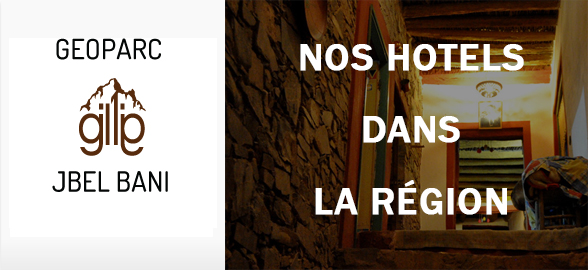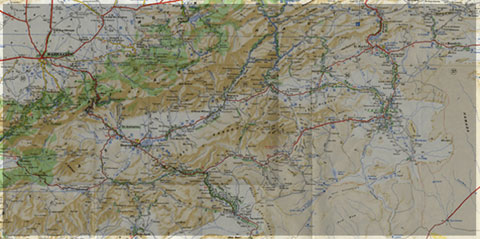Recherchez sur le site !
Recherche avancée / SpécifiqueCatégories publications
+ Sciences De La Terre - Archéologie - Astronomie - Spéléologie - Ecologie - Pédologie - Volcanologie - L'hydrogéologie - Géomorphologie - Minéralogie - Pétrologie - Paléontologie - Géologie + Climatologie - Réchouffement climatique - Changement climatique + Plantes - Plantes Aromatiques - Plantes médicinales + Zoologie - Faunes + Botanique - Flors + Sciences humaines - Géo Eco Tourisme - L’anthropologie - L'Histoire - Démographie - Sociologie - Géographie - Patrimoine culturel
Géo éco tourisme inclusif

Géoparc et Recherche Scientifique
Le coins de l’étudiant



Blog Géoparc Jbel Bani
Systemic Practice and Action Research https://doi.org/10.1007/s11213-022-09598-9
ORIGINAL RESEARCH
The ‘Covid‑Trigger’: New Light on Urban Agriculture and Systemic Approach to Urbanism to Co‑Create a Sustainable Lisbon
Sandrine Simon
Accepted: 28 March 2022
© The Author(s), under exclusive licence to Springer Science+Business Media, LLC, part of Springer Nature 2022
Abstract
In 2018, Lisbon won the title of Green capital of Europe 2020. It was described by the Expert Panel as an inspirational city which had started its journey towards sustainability during a period of economic crisis. A year later, Covid-19 had become a global pandemic. Imposed confinements highlighted the extent to which globalisation has spread the virus, as well as the particular fragility of places like cities where people, living together, were asked to not physically interact anymore. Exploring further that very particular global crisis can help to identify the faults in our economic systems and to ask why Lisbon was neither resilient nor sustainable in the face of that adversity. In addition to highlighting how weak our health is, Covid-19 has exacerbated vulnerabilities in Lisbon such as job losses (especially in the touristic sector), food supply (Portugal imports 70% of its food) and food waste. This paper explores how the activity which, ‘par excellence’, meets the most basic of our needs (food), through the example of Urban Agriculture (UA), could contribute to discussions on what makes a city sustainable. A literature review on UA in Lisbon highlights its various benefits, complemented by a broader literature review which converges to showing how UA can help to address the vulnerabilities generated or exacerbated by Covid. Having shown its potential contribution to addressing crises, this article then suggests to examine how systems approaches could help to incorporate UA further in a new type of more participatory urbanism aimed at creating sustainable cities.
Keywords: Urban agriculture · Resilient sustainable Lisbon · Food networks · Social urbanism · Systems approaches to urbanism
Introduction
With its title of Green capital of Europe 2020 and its 27 hectares of UA initiatives, Lisbon is a good example of a city that has found the way to produce its food and integrate food production into its environmental strategy. A rich literature on the subject .
CeiED (Interdisciplinary Centre for Education and Development), Universidade Lusofona de Humanidades e Tecnologias de Lisboa, Campo Grande 376, 1749-024 Lisboa, Portugal
(Mougeot 2015; Oliveira and Morgado 2016; Delgado 2017, 2018a; Dias and MaratMendes 2020) has been describing the wealth of existing UA initiatives over the last decade. Yet, this same literature deplores the fact that UA is not further integrated in urban strategies aimed at making Lisbon more sustainable.
That UA has the capacity to help citizens deal with crises has been proven throughout time. In Western Europe, authorities encouraged urban allotments in the 1 9th c. and, during the major humanitarian crisis of World Wars I and II, UA provided urgent food provision. In Portugal, people’s ability to produce their own food was further reinforced when Portugal joined the EU in 1986 and turned its back to agriculture. With the Covid-19 crisis hitting hard the economy and, in particular, its tertiary sector (with a thenvibrant touristic industry), with more than 30% of people having lost their jobs (mainly in the tourism industry) and food banks getting overwhelmed (Correio da Manha 2020), a paradigmic shift may have taken place, enabling to approach UA in a new light.
The main questions this article asks are: i) Will the Covid crisis trigger a shift in the way in which ‘sustainable strategies’ for the city are being designed as well as in the content of these strategies with a stronger focus towards resilience and ii) Could UA help as a catalyst to develop systemic urban planning?
To answer them, Part I first presents a literature review on the benefits of UA in Portugal and elsewhere – since research on UA has gained interest in Northern countries after being mainly carried out in ‘the South’ (Morgan 2014; Mougeot 2015) – and shows how these benefits contribute to addressing the Covid crisis in various ways. In Part II, having observed that these benefits deal with the various dimensions of ‘sustainability’, the article explores whether lessons drawn from UA could contribute to the development of a more participatory type of ‘social urbanism’, aimed at progressively transforming a city into a sustainable one. This research examines to what extent systems approaches could, with the help of a practical case study such as UA, demonstrate that creating a sustainable city goes beyond greening it.
PDF Article Complet
Source web par : Sandrine Simon
Les tags en relation
Dictionnaire scientifique
Plus de 123.000 mots scientifiques
Les publications
Géo parc Jbel Bani

Circuits & excursions touristiques

cartothéques


Photothéques
Publications & éditions




